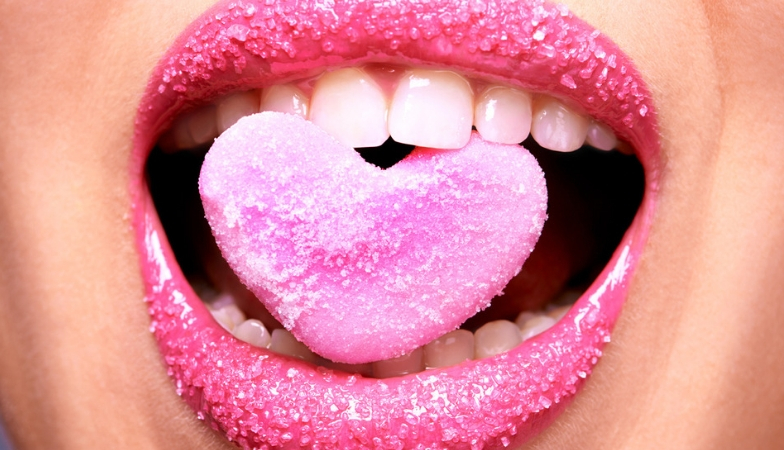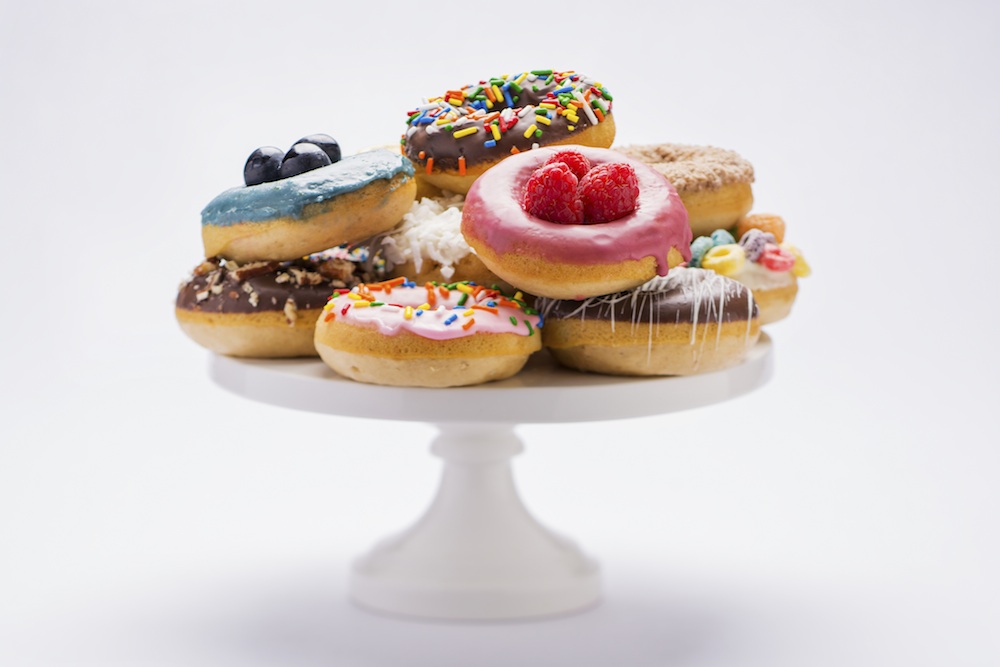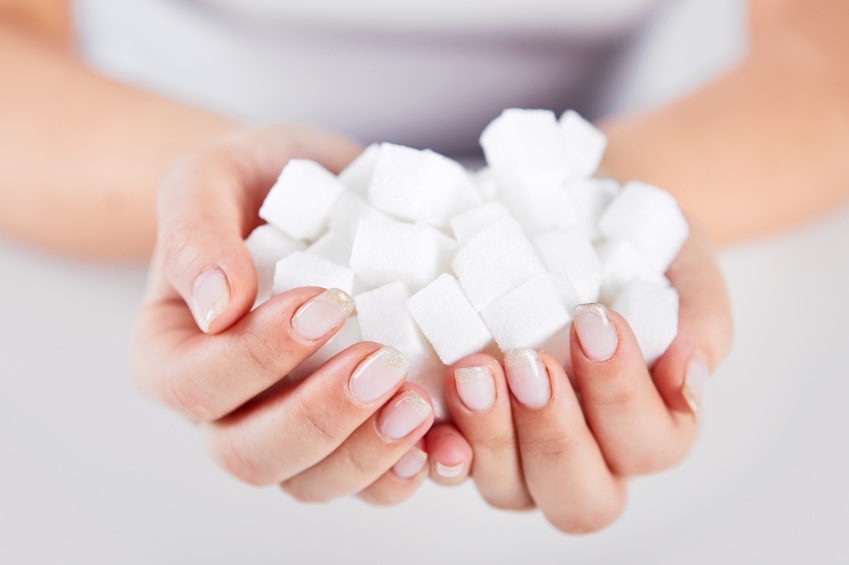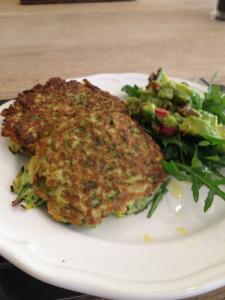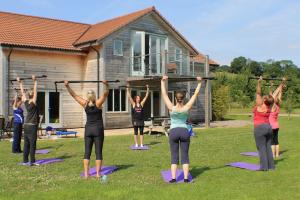Can a sugar detox retreat help you give up sugar for good? Sugar addict Sharon Walker finds out
It’s perhaps no surprise that I’ve got a sweet tooth. I was born above my Dad’s sweetshop. Saturdays were spent weighing sweets and later selling chocolates from a market stall. At eighteen I went to work in the family business and promptly gained a stone from my ‘work’ in sample room. I rebelled by becoming a health journalist, but the sweet tooth remained.
Granola is a controlled substance in our house (I could finish the packet, if not in one sitting then certainly in a day.)
I think to say I’m an addict might be overstating the case, but I certainly have my moments. That open packet of Haribos hidden away in my son’s drawer? It beckons like a siren’s call. Granola is a controlled substance in our house (I could finish the packet, if not in one sitting then certainly in a day.) I avoid filling up the car late at night, risking running out of petrol rather than test my willpower in front of a counter of cheap sugar thrills at that vulnerable hour. It’s fair to say that my sugar avoidance strategies are well honed. I still get my sneaky sugar highs, but these days they come in stealth forms. Honey in tea; a glass of wine or three; Joe and the Juice smoothies. At the end of the day it’s all sugar.
I avoid filling up the car late at night, risking running out of petrol rather than test my willpower in front of a counter of cheap sugar thrills at that vulnerable hour.
And I’m not the only one who’s hooked. We’re consuming 60 grammes of added sugar a day (160 teaspoons a week) in the UK – 40% more than our grandparents. While the World Health Organisation say only 5% (5-6 teapoons for women) of our calories should come from added sugar. It’s not our fault. Experts now think sugar is as addictive as cocaine – it has an almost identical chemical structure and lights up the same dopamine reward pathways in the brain. What’s more a whole generation of young people are being hard-wired to want more, not just by ODing on chocolate, or sugar it’s more obvious forms, but through the sweet stuff hidden in almost everything from ready meals to breakfast cereals (80% of foodstuffs in American contain sugar, and here in the UK we’re quickly catching up).
We’re consuming 60 grammes of added sugar a day (160 teaspoons a week) in the UK
You could just say so what? Why bother? What’s a little sweetness in the grand scheme of life after all, but sugar is EVIL. It’s not fat that we can blame for the current obesity epidemic but sugar. Why? Because sugar messes with our insulin levels, which in turn boosts fat stores. Not only that, sugar is a major inflammatory agent. Sugar increases free-radicals and the risk of almost every illness going from diabetes and cancer through to Alzheimer’s. It also attacks our skin. Sugar = wrinkles. It’s enough to make you want to reach for the nearest Mars Bar.
Experts now think sugar is as addictive as cocaine – it has an almost identical chemical structure and lights up the same dopamine reward pathways in the brain.
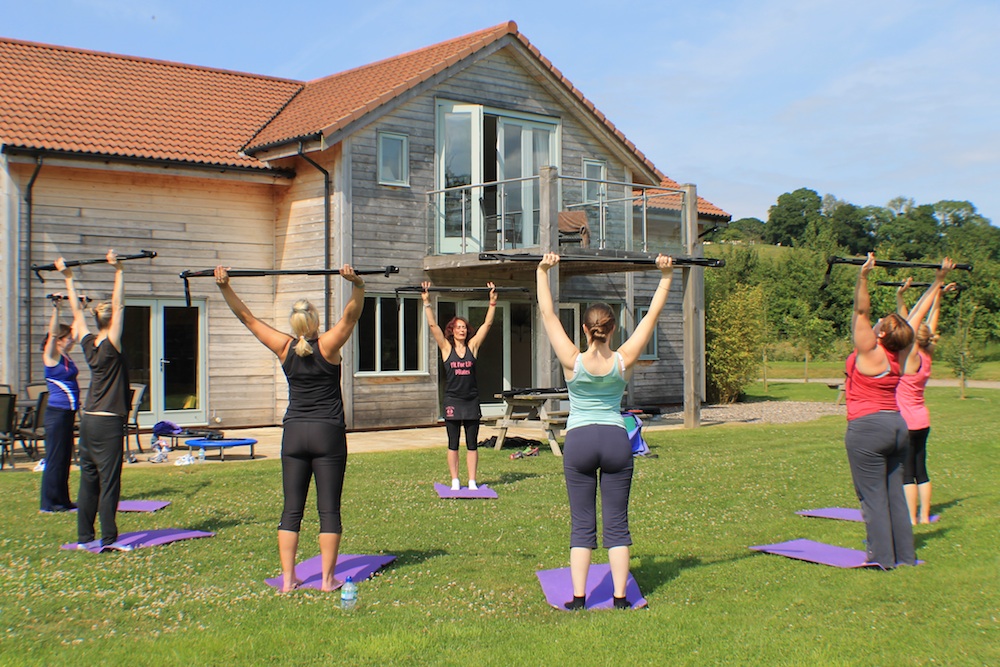
The garden of the retreat
It’s not that easy cutting it out. Believe me I’ve tried. Fortunately a raft of experts have come to the rescue. The Body Retreat launched their Sugar Detox retreat earlier this year, while psychotherapist Lou Lebentz, who worked at the Priory for 12-years has switched to dealing exclusively with sugar addiction. Their courses are not so much low-sugar ‘diets’, more ‘lifestyle interventions’, such as you might see in rehab, with psychological and motivational techniques, together with education on how to avoid hidden sugars and an understanding of the brain chemistry. ‘Sugar has the same effect on our pleasure centres as sex, love, success,’ explains The Body Retreat’s Juls Abernethy. ‘People self-medicate with sugar, but like any drug you build up a tolerance. If you’re very clean even a little bit will give you a hit. But the more you consume the less sensitive you become. I’ve known women who regularly consume 10,000 calories in one sugar binge.’
Sugar has the same effect on our pleasure centres as sex, love, success
Abernethy says she got the idea for their Sugar Detox week when she was trying to quit herself. ‘I’m actually a sugar addict and I’m sensitive to both sugars and starches. I quickly realised that just trying to cut back wasn’t working, when you’re addicted like I am it’s like being a drug addict. Giving up can be very difficult because it’s a genuine craving. People want to stop, but they can’t. It has such a hold. That’s the problem with addiction, it’s to do with a person’s chemical make-up. You’d sell your children or go out in the middle of the night in your jammies. (Something she admits she has done herself in the past). Those first few days are the hardest to get through. A lot of people end up replacing the more obvious sugars in their diets with a craving for starch, so rather than eating Mars Bars they go for baked potatoes with piles of baked beans, where the starch quickly converts into sugar and gives a similar rush and rebound.’
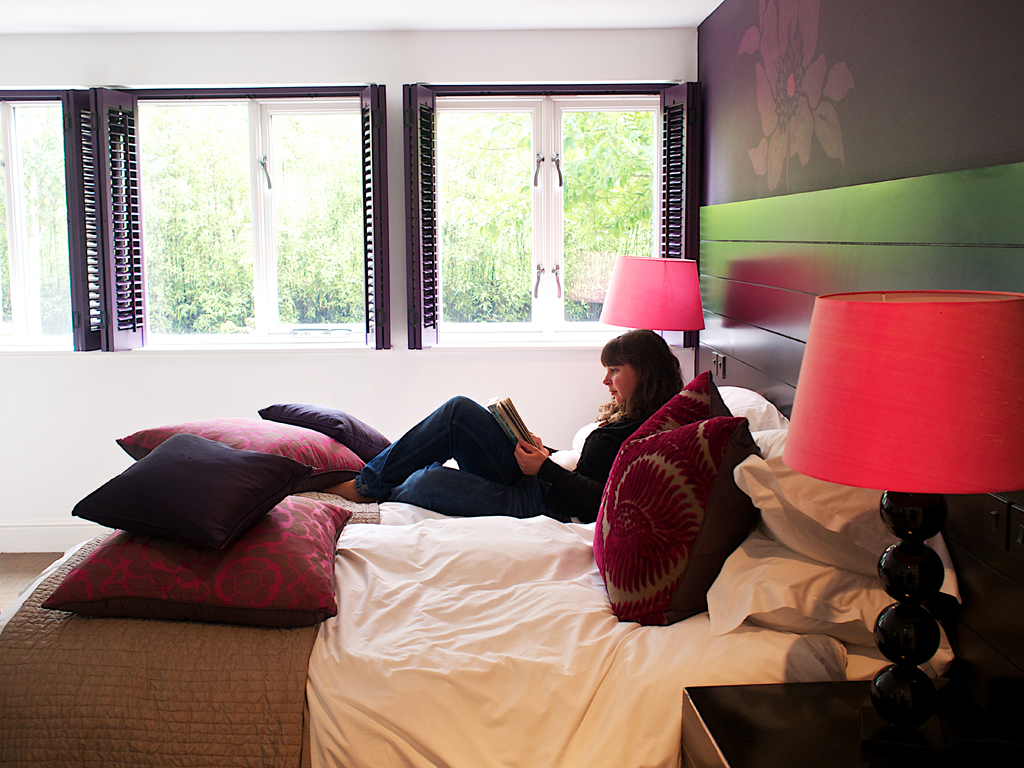
One of the luxurious rooms you can expect to stay in at The Body Retreat
The Body Retreat run their 7-day sugar detox retreat in a comfortable modern house in Somerset. If you’re going to go cold turkey, this is the place to do it, midst saunas and massages, miles from the nearest all-night garage. Here in the supportive bosom of the Body Retreat when we’re crying into our pillows for hot chocolate and digestive biccies, they’ll be there to catch us with soothing hypnosis and pampering treats and the moment will pass. That’s the theory anyway.
As long as you’re eating nutrient-rich food 80% of the time the other 20% of your diet can include the occasional elective sugary item
Day one Juls gives us a talk. I’m relieved to learn that in my new post rehab life there will still be room for the odd Haribo. Once we’ve got clean I’ll be able introduce the white stuff. It’s not like AA or NA. Abernethy is of the opinion that total sugar avoidance is impossible and not a desired goal. ‘As long as you’re eating nutrient-rich food 80% of the time the other 20% of your diet can include the occasional elective sugary item.’
The women here are at different points along the addiction scale. Some, like me, have the sneaky feeling that their diet could be cleaned up; they could lose a few pounds and they’d rather not feel compelled to lock their kids’ sweets in a cupboard. Or hide biscuits in the car boot, like I do. Then there are those for whom sugar is a more serious problem. ‘One lady was eating one pack of Haribos, a four pack of chocolate eclairs, two packets of cookies, and one large pack of toffee-coated popcorn washed down with Diet Coke at one sitting,’ Juls tells me. ‘Other people have eaten so much fructose they’ve developed an intolerance and are beset with IBS or a high mucus production cough.’
We are to learn new ways to manage our cravings, like brushing our teeth when they hit. ‘Particularly after a meal if you are a pudding fiend, get into the habit of doing this after every meal so that it really becomes embedded. This new behaviour immediately replaces the old one (scoffing a pudding). You are signalling to your brain that you are complete and won’t eat anything else for a while.’ Abernethy tells us.
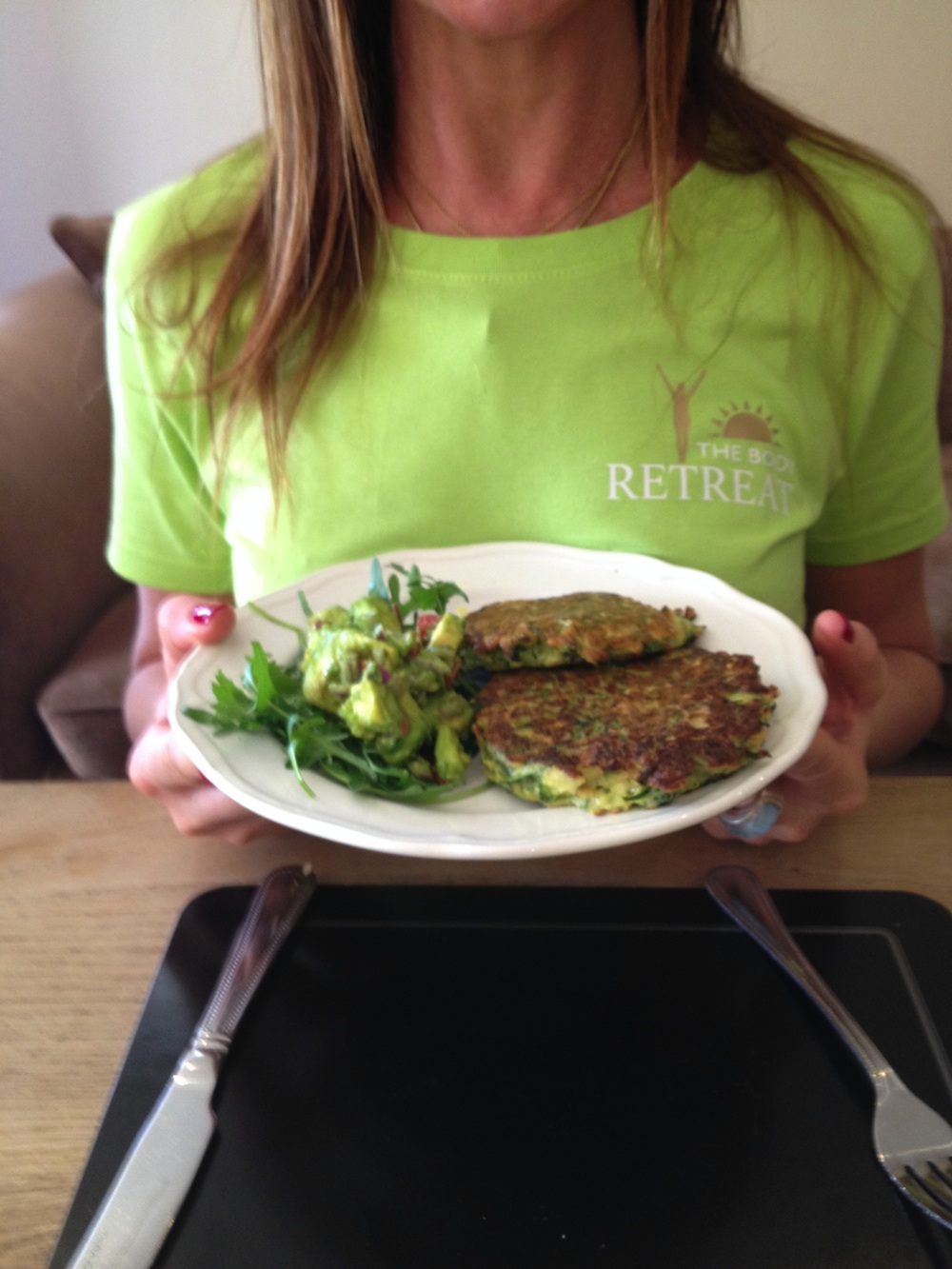
Courgette and pea protein fritters with salad
We are to learn new ways to manage our cravings, like brushing our teeth when they hit.
The food here, as you might guess is low sugar, but also low starch. ‘I call it the green and white diet,’ says Abernethy. We’re mostly eating fish and chicken and green vegetables. Then there’s the odd egg and a few nuts and seeds for additional protein energy. ‘This diet is very light on the digestion. You’re totally alkalising the system. All the greens will support the liver detox,’ Juls tells us over a delicious oven baked cod with a pesto crust (home made walnut, spinach and parsley , but no cheese) served with garlicy greens topped with roasted seeds.
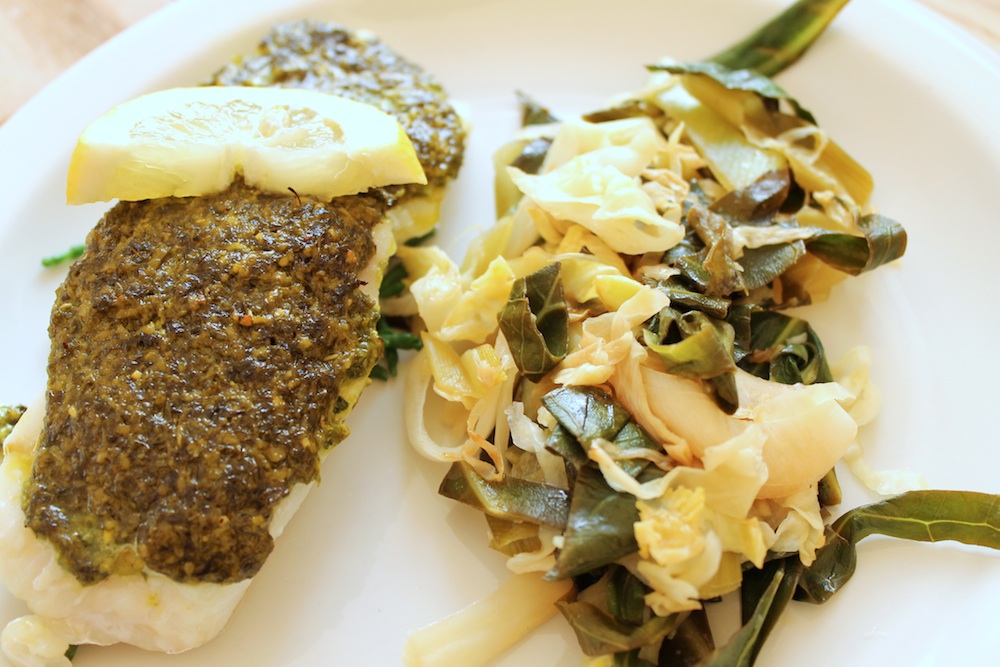
Cod with walnut and parsley pesto crust with garlic greens
By day two I already feel lighter and cleaner, but day four is hellish, I’m totally exhausted and craving sugar. If I could be bothered to move I’d crawl to the nearest newsagent, but my body feels like a lead balloon. Abernethy isn’t surprised. ‘You’ve used up your energy reserves, the cravings tend to kick in stronger. We originally ran sugar detox as a four-day camp but then we found some people were hitting their lowest point back home, so we extended the camp to seven days so that we can support you all the way through. That’s where the massages come in, they hit the same dopamine reward centre as the sugar.’ And yes I can confirm the massages from The Body Retreat’s therapists Tam and Sharon really are as good as a salted caramel ice-cream.
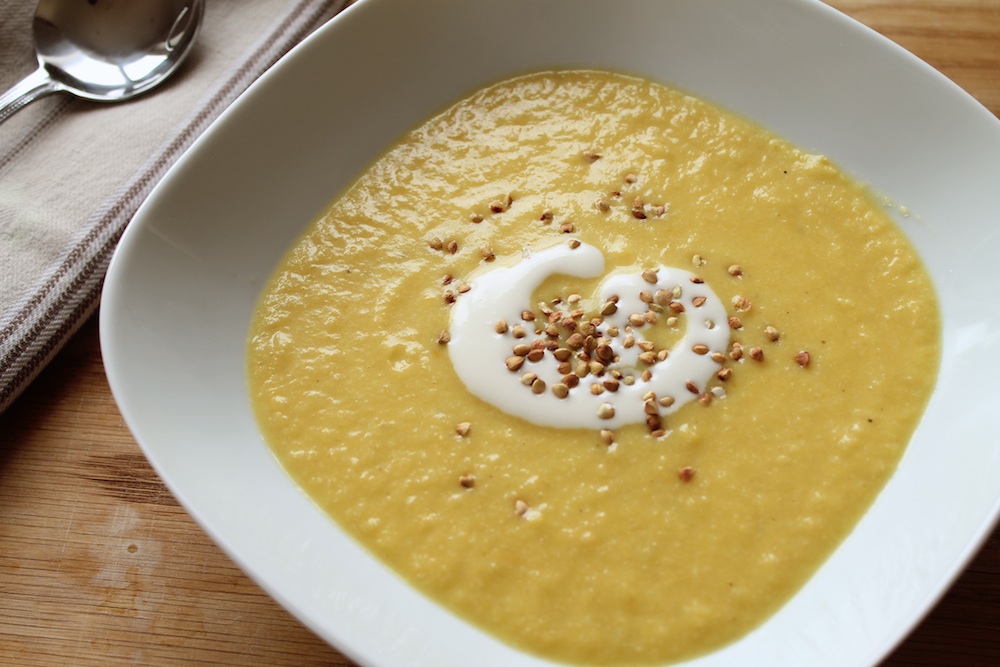
cream of vegetable soup with coconut cream and toasted buckwheat groats
Removing sugar totally for a week really works. By day six I can even drink a cup of tea without feeling irritated by the lack of honey. I make it to day seven without bribing the yoga teacher to smuggle in Malteasers. I’ve opted for the optional weigh-in and weigh-out, which reveals I’ve lost 5lbs. One woman has lost a whopping 9lbs, it’s partly water Juls tells us, but we’ve been doing some light exercise, including morning hikes and swimming, so a fair proportion is fat too.
By day six I can even drink a cup of tea without feeling irritated by the lack of honey.
We are sent home with a kind of sugar decompression programme, tailor-made according to our sensitivity levels. An unlucky few won’t ever be able to reintroduce even natural sugars. One woman in our group won’t even drink a smoothie laced with a few berries for fear of tipping over the edge into full sugar binge. Fortunately this doesn’t apply to me and I can gradually reintroduce sugar step-by-step, starting with starchy veg and apples week one, berries and milk and yogurt week two (yes lactose is sugar too) and eventually fruit, wholegrains and rye bread week 3, week 4 even includes dark chocolate and a glass of red wine.
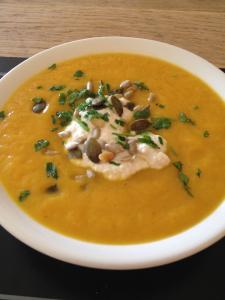
the soup is easy to recreate at home
But what if we blow it with a Mars Bar meltdown? ‘It’s fine, you haven’t undone all your good work,’ says Abernethy. ‘You don’t need to wade in with guilty recriminations. Just pick up the plan where you left off. This is a plan for life.’
The goal is not a state where you never eat sugar again, but where you’re not bothered whether you do or not.
Back home my son has left an opened packet of chocolate on his desk. Normally I’d pounce on it. Or make him hide it from me, but I manage to help him with his homework without sneaking even a sniff. ‘People tell us they finally have the feeling of being in control. That their sugar ‘hooks’ lose their appeal and no longer have the same hold. They can go into a bakery and not feel the need to buy stuff or walk down the biscuit aisle in the supermarket.’ You’d think they’d want to avoid these trigger situations, but in fact Abernethy says it’s this exposure and subsequent desensitisation that’s key to long-term success of the programme. ‘The goal is not a state where you never eat sugar again, but where you’re not bothered whether you do or not.’
11 ways to avoid hidden sugars:
- Eat food you’ve made yourself from scratch.
2. Beware of sugar hidden in ‘health’ food. Especially gluten-free foods where the gluten is often replaced by other starches or sugar.
3. Many savory foods like bread, baked beans or tinned soups are high in added sugar.
4. Fruit is high in sugar, but it’s generally fine to have a piece or two a day. If you want to eat fruit add a portion of protein like cheese, nuts or yoghurt.
6. Low-fat diet foods are usually high in sugar.
7. Check the label. Avoid all foods where sugar makes up more than 8g in every 100g.
8. Learn all the words for sugar not just sucrose, but dextrose, fructose, lactose, maltose – almost any ‘ose’.
9. Healthy sugars are still sugar. Agave, honey, molasses all produce the same insulin surge as sucrose.
10. Xylitol is a better sugar substitute as it doesn’t react in the same way in the body and despite it’s chemical sounding name is better for you than other sweeteners.
11. Swap white grains and rice for wholemeal versions.
The Sugar Detox Retreat is taking place on Mon 25th Jan – Fri 29th Jan 2019 (£1,850.00 (shared room) – £2,000 (single occupancy)) and Monday 21st Jan – Fri 1st Feb (£3,700- £4,100)
The Sugar Detox Retreat takes place at The Body Retreat Somerset venue.
Getting there: The Sugar Detox Retreat is held in Somerset near the town of Tiverton. The nearest train station is Tiverton Parkway which is 2.15 from Central London.
Like this article? Sign up to our newsletter to get more articles like this delivered straight to your inbox.



